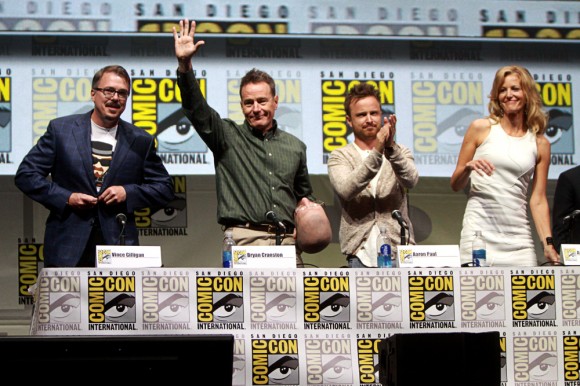
From left to right: Vince Gilligan, Bryan Cranston, Aaron Paul and Anna Gunn speak at the 2013 San Diego Comic Con International for “Breaking Bad” at the San Diego Convention Center. (Photo Courtesy of Gage Skidmore/Wikimedia Commons)
| When I heard the learn’d astronomer; | |
| When the proofs, the figures, were ranged in columns before me; | |
| When I was shown the charts and the diagrams, to add, divide, and measure them; | |
| When I, sitting, heard the astronomer, where he lectured with much applause in the lecture-room, | |
| How soon, unaccountable, I became tired and sick; | |
| Till rising and gliding out, I wander’d off by myself, | |
| In the mystical moist night-air, and from time to time, | |
| Look’d up in perfect silence at the stars. |
Fans of America’s highest-rated television show will recognize this poem as the Walt Whitman classic recited by vegan methamphetamine manufacturer Gale Boetticher. But you may have never asked yourself why head writer and producer Vince Gilligan chose this poem to act as such a plot-altering incorporation into AMC’s “Breaking Bad.”
In her senior seminar, “Reading Breaking Bad,” assistant English professor Richelle Munkhoff asks her students that very question.
Munkhoff presented a one-hour workshop about her class in the UMC Friday afternoon. The event was organized by the English department as part of the “besides football” activities offered by CU to alumni as part of the university’s 100th annual homecoming weekend.
“I really wish we’d had classes like this when I went here,” said CU alum Scott Slaby, who attended Munkhoff’s workshop on Friday.
At first it might be hard to take an English class about a TV show seriously, but ENGL 4039, a senior seminar offered during spring semester at CU, isn’t a class to be taken on a whim because you liked watching the show. It’s an intensive literature course and is restricted to juniors and seniors majoring in English or humanities.
“I’m a Shakespeare professor, but I also watch television,” said Munkhoff. “As I was watching the show, I realized that it was very Shakespearean in its level of tragedy. Even with the show having this relationship to Shakespeare, I don’t think I would have taught it if it weren’t for some very specific moments of literariness within the show.”
One of these moments was a trailer for the second half of the show’s final season, which consists of eerie desert scenes and Bryan Cranston reciting the poem “Ozymandias” by Percy Bysshe Shelley.
While watching Breaking Bad, Munkhoff appreciated its literary merit, but it never occurred to her that she might teach a whole course about the show.
“When I was watching it I would think, wow, this is very smart, [the writers] must all have been English majors,” said Munkhoff. “Then I read a blog post by Andrew Sullivan, about how Breaking Bad was very Machiavellian, and that’s when it hit me — maybe I should teach a course on the show.”
There are a few obvious literary topics to talk about with regards to Breaking Bad, like “Leaves of Grass,” the Whitman masterpiece that has a heavy presence in the show’s fourth and fifth seasons, and the previously mentioned “Ozymandias” poem.
Munkhoff covers these works as well as some less obvious connections, like the characters of King Lear, Richard III and Dr. Faustus, and Kafka’s “Metamorphosis”.
“People think its just an easy A, taking a class about a TV show,” said Collin Heng-Patton, a fifth-year senior majoring in English and sociology. “But it was really hard. We read things like Machiavelli and Leaves of Grass, we got really into the literary devices of the show, and we had to write a couple of really involved papers.” Heng-Patton took Munkhoff’s course last semester.
“It’s a bold move creating a class that revolves around pop culture, especially TV,” he said. “A lot of people in the English department think we should just be reading Milton and Emerson. But this class is relevant, it’s interesting and it’s definitely the best I’ve taken since I’ve been here.”
The course will be offered next semester, and despite its enrollment restrictions, seats are expected to fill quickly.
Contact CU Independent Staff Writer Matt Vail at matthew.vail@colorado.edu
